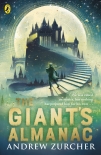The Giant's Almanac, Andrew Zurcher [accelerated reader books txt] 📗

- Author: Andrew Zurcher
Book online «The Giant's Almanac, Andrew Zurcher [accelerated reader books txt] 📗». Author Andrew Zurcher
Fitz took his seat at the table by Clare’s side. Ned sat across from them, with Mr Ahmadi to his left. Professor Farzan locked the heavy panelled door through which they had entered, and then placed the key, carefully, on the end of the table. Beneath the glow of the lamp, the gold key cast its image deep into the polished surface of the mahogany table.
‘I understand you’ve all had a difficult day, and it is very late,’ said Professor Farzan. ‘I am sorry to have arranged our meeting in this way, and I am sorry to keep you from your beds. For reasons that will become clear, it was necessary that we should meet when the museum was closed. And necessary that you should enter the museum without being seen – neither by the guards, nor by the cameras.’
Ned was looking at the key, thinking, Fitz thought, what he was also thinking.
Why had Farzan locked the door?
‘Many people have recently developed an interest in our young friend –’ he gestured to Fitz – ‘and some of them are dangerous. I want to explain to you what I know, in the hope that it will help you to stay safe – in the hope that it will help all of us to stay safe.’
Clare had taken Fitz’s hand beneath the table. Fitz thought that her hand was very cold. He looked at her and was surprised to see, for the first time in his life, that her cheek had no colour in it at all. She looked grey.
‘The situation may not make sense, and yet it is actually very simple. A few weeks ago, the British Museum received a rather important delivery: almost a thousand objects, each one of them a priceless historical artefact, from the collection of a fabulously wealthy magnate, recently deceased. These pieces were acquired abroad, and have only just been brought to this country; the dead man’s estate has offered us a limited opportunity to study the collection, here in the museum, as a courtesy – though naturally any detail we can add to the understanding of the items it contains will only increase their value. Once we have finished our work, the objects will return to the family, and disappear again from view – maybe forever.’
‘The heir to a collection like this will become very rich,’ said Ned.
‘He is heir to much more than this,’ said Mr Ahmadi. His lips were as thin and tight as nails. ‘You cannot possibly imagine.’
‘Quite,’ said Professor Farzan. ‘But for now, this is our chance. We’ll be allowed to keep one or two things for our permanent collection, but only that. One or two. For the rest, we have about three weeks to catalogue them, describe them, study them, photograph them. Most of the museum’s curators were transferred to this project – the collection contains objects of all sorts – paintings, sculpture, funeral plaques, precious stones, clothing, books, coins, even mummies – everything. Some of it is comparatively modern, some of it older, some of it impossibly old. Some pieces are European in origin, some Chinese, some African; but the most interesting part of the collection – and this is where I come in – dates from the Sassanid period of Persian history, about seventeen hundred years ago. The moment I began to work on this material, I discovered something very unsettling.
‘There are two manuscripts here. They are two copies in Middle Persian of the same text. They are old – more than a thousand years old – and were themselves copied from an older original, now lost. They tell of a great treasure buried in the desert in what is now Iran. They don’t say where it is, but they describe what it is – a hoard so extensive, so diverse, that it would tell us unimaginable things about ancient history – about the Greeks, about the Romans, about the ancient Parthians themselves, and all the cultures that bordered anywhere near the Silk Road that ran through Persia between Europe and China, for millennia. It’s the sort of thing that archaeologists and museum curators fantasize about. According to these manuscripts, the hoard was buried by a group of slaves who were themselves buried with the treasure; not a single person survived to speak of its location – not even the king who ordered it to be buried could find it.’
‘Surely you don’t believe stories about buried treasure,’ said Clare. ‘You’re a scholar, working in a museum.’
‘“The treasures of time lie high, in urns, coins and monuments, scarce below the roots of some vegetables”,’ answered Professor Farzan. ‘Much that this museum contains was once buried treasure. The tombs of the Pharaohs, the graves of countless Egyptians, Assyrians, Romans, Greeks – all of these were plundered by Victorians hoping to strike it rich in one way or another. But you’re right, in a sense. I don’t usually believe stories about buried treasure; however, that’s only because I reckon most of that buried treasure has already been dug up. But then, last week, while I was working on another part of the collection – completely, as I thought, unrelated, I found something shocking.’
Farzan picked up the large, leather-bound book from the table, and turned it so that the others could see. He opened its cover to the title page.
‘This is a volume from the





Comments (0)